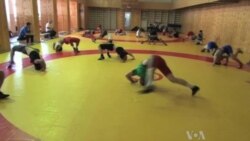KHASAVYURT, DAGESTAN, RUSSIA —
The crowded wrestling schools in the city of Khasavyurt in the Russian republic of Dagestan have a tradition that's rich in Olympic champions. At the Irbaikhanov Olympic preparatory school in Khasavyurt, young grapplers are determined to chase Olympic glory. Their Olympic dreams, however, increasingly face impossible odds.
This September in Argentina, the International Olympic Committee will vote to see if wrestling will make its 2020 roster of sports. Olympic hopefuls are not the only fighters, though, in this troubled region. Russian special forces raids against Islamist militants are a daily threat in Khasavyurt. These militants actively recruit able-bodied athletes to join the insurgency in the North Caucasus.
But Asrudin Bataev, the head trainer at the Irbaikhanov school, said the dream of becoming an Olympic champion keeps his students in the gym and out of reach of the extremists.
"In our school alone we have over 2,000 people," he said. "But in general across the city we have so many schools that specialize in wrestling, and how many kids we've in some way saved from extremism or terrorism, so they basically don't mess with that."
Starting at the age of 15, wrestlers begin training two to three times a day at the Irbaikhanov school. This strict training regimen, backed primarily by funding from the Kremlin, has produced a rich tradition of Olympic champions. Wrestlers from Khasavyurt, a city of roughly 133,000, have won eight gold medals in the past four Summer Olympic Games. The yearly budget at the Irbaikhanov school - about $580,000 - helped fund six winners of those eight gold medals.
But European Champion and graduate of the Irbaikhanov school Zaur Bataev worries about the financial impact and potential backlash if wrestling is cut from the Olympics.
"If wrestling is removed from the Olympics, then that will stop funding for some places, and in some places that will close schools," he said. "If we rip away all the wrestling gyms, if we close all the gyms and say that your sport is no longer in the Olympics, that will increase crime, that will increase banditry, that will increase all negative things of that nature."
North Caucasus Islamic Research Center director Ruslan Gereev does not think that crime and violence will increase in Dagestan.
"Every athlete that goes and joins the armed underground with the rebels is a loss for the state," said Gereev. "But if we compare the situation in Khasavyurt now to what is was like a year or two ago, back then there was really a lot of terrorist attacks and rebel fighters.”
Long-term stability in Russia’s North Caucasus, however, can be difficult to predict.
For now, wrestling classes in Khasavyurt continue to busy thousands of young men with high energy and dreams of Olympic glory. But the future of wrestling in Khasavyurt and Russia’s North Caucasus may rest on the future of wrestling as an Olympic sport.
This September in Argentina, the International Olympic Committee will vote to see if wrestling will make its 2020 roster of sports. Olympic hopefuls are not the only fighters, though, in this troubled region. Russian special forces raids against Islamist militants are a daily threat in Khasavyurt. These militants actively recruit able-bodied athletes to join the insurgency in the North Caucasus.
But Asrudin Bataev, the head trainer at the Irbaikhanov school, said the dream of becoming an Olympic champion keeps his students in the gym and out of reach of the extremists.
"In our school alone we have over 2,000 people," he said. "But in general across the city we have so many schools that specialize in wrestling, and how many kids we've in some way saved from extremism or terrorism, so they basically don't mess with that."
Starting at the age of 15, wrestlers begin training two to three times a day at the Irbaikhanov school. This strict training regimen, backed primarily by funding from the Kremlin, has produced a rich tradition of Olympic champions. Wrestlers from Khasavyurt, a city of roughly 133,000, have won eight gold medals in the past four Summer Olympic Games. The yearly budget at the Irbaikhanov school - about $580,000 - helped fund six winners of those eight gold medals.
But European Champion and graduate of the Irbaikhanov school Zaur Bataev worries about the financial impact and potential backlash if wrestling is cut from the Olympics.
"If wrestling is removed from the Olympics, then that will stop funding for some places, and in some places that will close schools," he said. "If we rip away all the wrestling gyms, if we close all the gyms and say that your sport is no longer in the Olympics, that will increase crime, that will increase banditry, that will increase all negative things of that nature."
North Caucasus Islamic Research Center director Ruslan Gereev does not think that crime and violence will increase in Dagestan.
"Every athlete that goes and joins the armed underground with the rebels is a loss for the state," said Gereev. "But if we compare the situation in Khasavyurt now to what is was like a year or two ago, back then there was really a lot of terrorist attacks and rebel fighters.”
Long-term stability in Russia’s North Caucasus, however, can be difficult to predict.
For now, wrestling classes in Khasavyurt continue to busy thousands of young men with high energy and dreams of Olympic glory. But the future of wrestling in Khasavyurt and Russia’s North Caucasus may rest on the future of wrestling as an Olympic sport.










